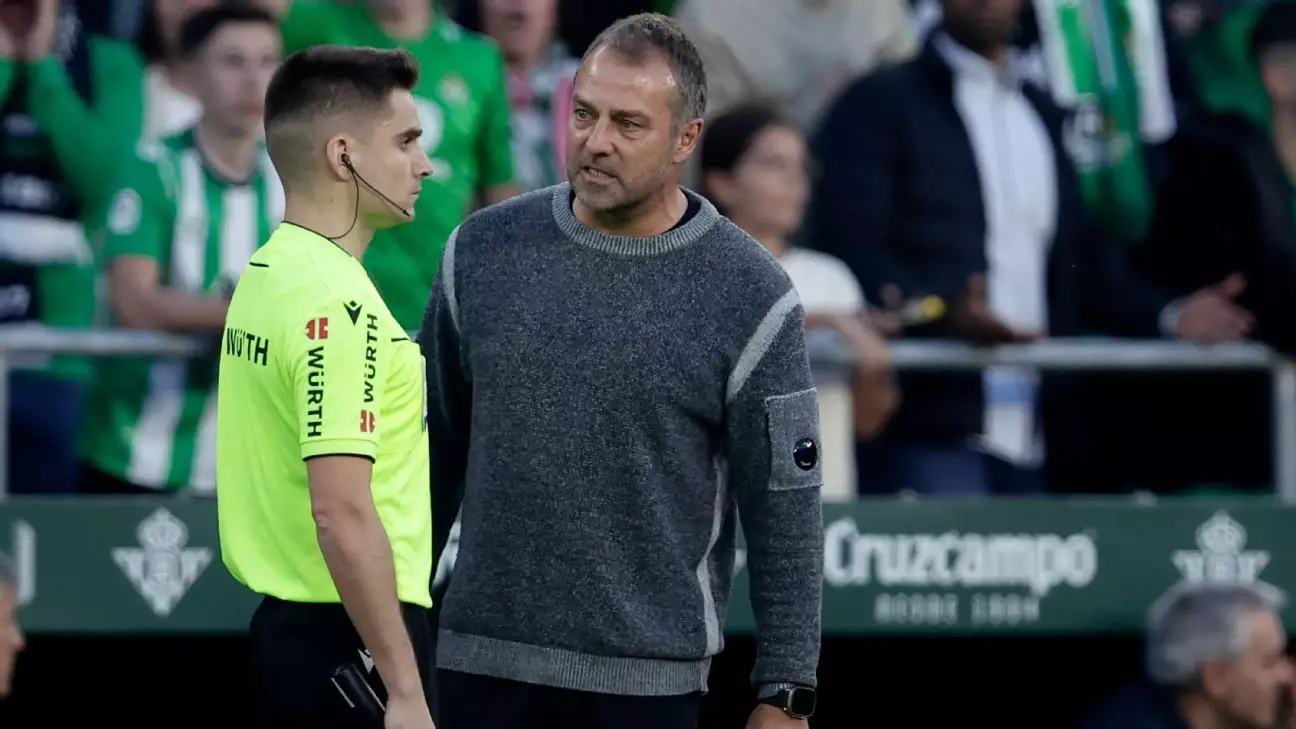In recent weeks, Barcelona’s coach Hansi Flick has found himself at the center of controversy following his two-game touchline ban, a consequence of his emotional outburst during a LaLiga match against Real Betis. The circumstances surrounding this incident serve as a poignant reflection on the pressures faced by those at the helm of competitive sports teams.
Flick was dismissed in the 66th minute of the match when he vocally contested a penalty awarded to Real Betis after an incident involving Frenkie de Jong. expressed his dissent towards referee Alejandro Muñiz Ruiz’s decision, which many perceived as an impulsive reaction rather than a calculated protest. In an environment where every decision can be pivotal to a team’s success, Flick’s response seems to illuminate the thin line that coaches walk between passion for the game and regulatory restraint.
Admitting his fault, Flick stated that his reaction was inappropriate, particularly given his earlier proclamation to the team about maintaining composure and not arguing with officials. Here, Flick’s self-reflection highlights a crucial aspect of leadership—accountability. Coaches are often looked upon as the embodiments of discipline, and this situation exhibits the importance of aligning personal actions with one’s teachings to the team.
The repercussions of this incident are profound, as Flick will miss critical matches, including the upcoming showdown against Leganés and the subsequent clash with Atlético Madrid. His absence will undoubtedly put added pressure on the assistant coach, Marcus Sorg, who will step up in his place. Flick has expressed confidence in Sorg’s capabilities, emphasizing that his team’s success relies not just on individual brilliance but on collective effort and mutual trust within the coaching staff.
Such a scenario raises questions about team dynamics and operational resilience. While a head coach’s vision is crucial, the ability to seamlessly transition leadership responsibilities is an equally essential aspect of team management. For Barcelona, maintaining their league position while facing the dual challenges of Flick’s ban and their fluctuating form will require a united front and clear communication.
Following the gripping 2-2 draw against Real Betis, Barcelona rebounded impressively with a thrilling 3-2 victory over Borussia Dortmund in the Champions League. This result may help to alleviate pressures building within the squad due to their recent struggles in LaLiga, where they dropped points in four of their last five matches. Flick’s acknowledgment of the need for emotional control points toward a broader theme in sports management—balancing personal passion with professional restraint during moments of high tension.
The return of key players such as Ronald Araújo has provided a much-needed boost to team morale. Nonetheless, the decision surrounding his minutes on the pitch underscores the strategic planning needed to integrate returning players effectively without risking exacerbating existing injuries. Balancing the team’s competitiveness with the well-being of its players is a nuanced challenge that requires careful thought and decision-making.
As FC Barcelona prepares for its next matches, all eyes will be on the coaching strategies deployed by Sorg in Flick’s absence. The ongoing situation serves as a reminder of the emotional and professional complexities inherent in leading a premier football club. Flick’s experience solidifies a critical lesson about the necessity of emotional intelligence in sports management—a lesson not just for coaches but for players as well.
Ultimately, for Barcelona to continue their path of success, they must embrace the challenges of discipline, emotional regulation, and team cohesion. As they navigate through these turbulent waters, it will be fascinating to see how the club responds, both on an individual and collective level, to the pressures of championship contention. The result of their efforts may well reinforce the notion that resilience in the face of adversity is a hallmark of true sporting greatness.

